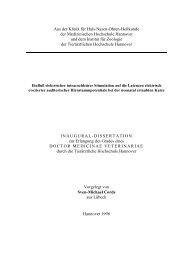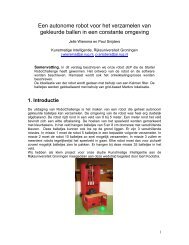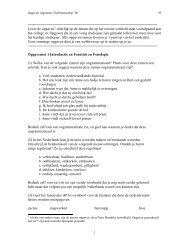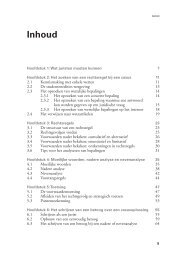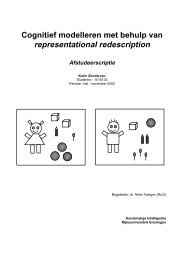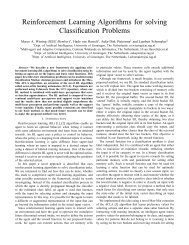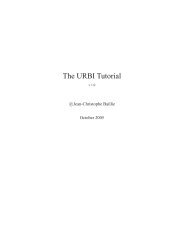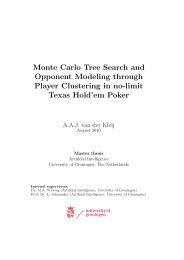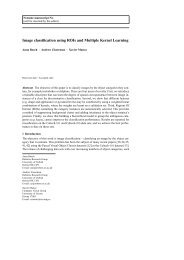Presuppositions in Spoken Discourse
Presuppositions in Spoken Discourse
Presuppositions in Spoken Discourse
You also want an ePaper? Increase the reach of your titles
YUMPU automatically turns print PDFs into web optimized ePapers that Google loves.
Chapter 5<br />
The second group is made up of traditional triggers that <strong>in</strong>duce<br />
presuppositions which do not accommodate easily. This group of triggers is<br />
<strong>in</strong>cludes the group of non-referential anaphoric triggers identified by Zeevat (to appear)<br />
which <strong>in</strong>cludes too, even, aga<strong>in</strong>, German wieder (aga<strong>in</strong>), and several Dutch particles,<br />
e.g. <strong>in</strong>derdaad, wel, toch, immers as well as the conjunction + particle omdat immers. 7<br />
Particles like too, also, and even have been identified by many researchers as <strong>in</strong>duc<strong>in</strong>g<br />
presuppositions that are difficult to accommodate (e.g. Stalnaker 1974, Kripke, ms).<br />
The only member from this group that was studied <strong>in</strong> the corpus was too, whose<br />
presuppositions were almost exclusively bound. For convenience I will call this<br />
group the non-accommodat<strong>in</strong>g group of presupposition triggers. The nonaccommodat<strong>in</strong>g<br />
group could also be thought of <strong>in</strong> a more positive way as th<strong>in</strong>gs<br />
that prefer to b<strong>in</strong>d, i.e. they prefer to be anaphoric. Tendency to b<strong>in</strong>d could then be<br />
described as related to the need to access or retrieve descriptive content for<br />
<strong>in</strong>terpretation.<br />
The third group is made up of traditional triggers that seem to <strong>in</strong>duce<br />
presuppositions that have little or no trouble accommodat<strong>in</strong>g. Obvious members<br />
of this group are the ones <strong>in</strong>duced by factives and big def<strong>in</strong>ite NPs, i.e. NPs<br />
modified by adjectives, relative clauses or <strong>in</strong> some cases prepositional phrases.<br />
Evidence that this third group accommodates easily comes from the well known<br />
examples <strong>in</strong> the theoretical literature on presuppositions, some of which are<br />
presented <strong>in</strong> (19) with the presupposition trigger <strong>in</strong> bold. From these examples we<br />
can see that factives like regret and po<strong>in</strong>t out, the focus particle almost, possessives and<br />
big def<strong>in</strong>ite NPs can be used felicitously by a speaker to add discourse-new<br />
<strong>in</strong>formation to a context (taken from Karttunen, 1974, p. 191, example 26).<br />
(19) a. We regret that children cannot accompany their parents to<br />
commencement exercises.<br />
b. There are almost no mispr<strong>in</strong>ts <strong>in</strong> this book.<br />
c. I would like to <strong>in</strong>troduce you to my wife.<br />
d. John lives <strong>in</strong> the third brick house down the street from the post<br />
office.<br />
e. It has been po<strong>in</strong>ted out that there are counter examples to my theory.<br />
The high frequency of accommodation <strong>in</strong> the corpus data presented here for<br />
factives, as well as for big def<strong>in</strong>ite NPs presented <strong>in</strong> the corpus work of Poesio &<br />
Vieira (1998), also confirm that the triggers <strong>in</strong> this group <strong>in</strong>duce presuppositions<br />
that tend to need to be accommodated.<br />
Two types of triggers, aspectual verbs and it-clefts, were studied <strong>in</strong> the<br />
corpus but weren’t mentioned as members of any of the three groups, e.g. small<br />
def<strong>in</strong>ite NPs, i.e. NPs with only an article and head noun, aspectual verbs, it-clefts.<br />
These triggers can all trigger presuppositions that can accommodate easily, but<br />
were not overwhelm<strong>in</strong>gly used this way <strong>in</strong> the corpus. In this way these triggers are<br />
7 Zeevat (to appear) says <strong>in</strong>derdaad is similar <strong>in</strong> mean<strong>in</strong>g to <strong>in</strong>deed, wel is similar to emphatic do,<br />
toch could be translated as after all, immers is similar to as you know, and omdat immers is<br />
approximately equivalent to because as you know….<br />
118



